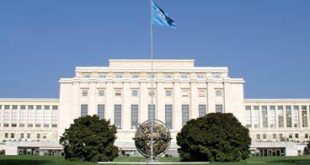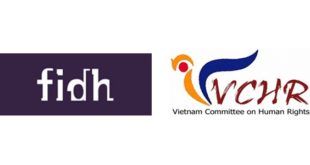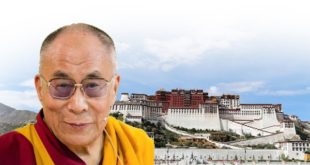LISBON, 24 April 2007 (VCHR) – 36th FIDH Congress from 22 to 24 April 2007 in Lisbon – In 2006, the Socialist Republic of Viet Nam almost became a State like any other : it entered the World Trade Organization (WTO), was removed from the United States Department of State’s black list of “countries of particular concern” in respect of religious freedom, and welcomed numerous leaders from Asia, the Americas and Oceania to the APEC Summit held in Hanoi in November 2006, all to general indifference.
And yet, the Socialist Republic of Viet Nam is far from fulfilling its commitments and undertakings to respect and promote human rights. The situation in respect of women’s rights, which was considered by the United Nations Committee on the Elimination of Discrimination against Women in January 2007, brought to light the superficial efforts being made by the Vietnamese regime to protect fundamental rights.
In fact, the Vietnamese government is paying mere lip service to its legal and written commitments to ensure respect for women’s rights, in particular social, economic and political rights. Domestic violence, trafficking in women and girls, the growing problem of AIDS, violations of reproductive rights, are all matters of grave concern that often go unacknowledged and unpunished by the authorities. This discourages women from denouncing violations and sends the message that such forms of discrimination are socially acceptable in Viet Nam.
At the same time, in its haste to join WTO the Vietnamese government conducted no study of the impact this would have on Viet Nam’s most vulnerable people. In this respect, the FIDH deplores the fact that the Vietnamese authorities have drawn no lessons from their policy of Renovation (Doi Moi – economic liberalization under strict political control – launched in 1986.
Doi Moi resulted in a combination of the worst aspects of unbridled capitalism with the worst in State totalitarianism : to meet the requirements of economic globalization, poor sectors of the population are left to fend for themselves, without social security or free basic education ; workers are exploited in appalling labour conditions, access to health care and education is limited, trafficking in women and girls and prostitution are increasing, the State exports labour to 40 countries with no worker protection, and corruption is rife. At the same time the Vietnamese State relentlessly represses all civil society movements and human rights defenders, prohibits a free press and freedom of expression and systematically controls the population.
For example, in 2003 journalist Nguyen Vu Binh was sentenced to seven years in prison for “spying”, but in fact for having used the Internet to spread articles critical of government policy and having participated in an anti-corruption association. His health has deteriorated because of his conditions of detention and lack of health care.
On 18 August 2006, the Vietnamese authorities again arrested Truong Quoc Huy for “attempting to overthrow the government”, in fact for having taken part in an Internet forum on democracy and for having backed a democratic movement in Viet Nam. He had been accused of the same crime in October 2005, arrested and held until July 2006.
Lastly, two recognized human rights advocates, Thich Huyen Quang, Supreme Patriarch of the Unified Buddhist Church of Vietnam (UBCV, an independent historic church that was banned in 1981), and Thich Quang Do, the UBCV’s second-ranking dignitary, are still being held in their respective pagoda-prisons, in Binh Dinh province and Ho Chi Minh City. Ardent proponents of freedom and democracy, and two of the Buddhist movement’s most prominent human rights representatives, they have known detention in all its forms (camp, prison, internal exile, house arrest) for over 25 years each. Thich Quang Do was awarded the Rafto Prize for human rights, but was not authorized to travel to Norway to receive it in November 2006.
The FIDH and its affiliates are shocked to observe that the Vietnamese authorities, far from protecting the welfare of vulnerable groups, the victims of both unfettered liberalization and widespread corruption, persist in repressing them and, when international events are held in Viet Nam, to dissimulate their presence from the eyes of the international community. Shortly before the APEC Summit in Hanoi, the authorities “cleaned” the streets of the capital, dispatched street children and prostitutes to Social Protection Centres – in fact prison-like establishments in which conditions of detention are very harsh – and arrested peaceful demonstrators.
These peaceful demonstrators, referred to as “victims of injustice”, are in the main peasants arbitrarily dispossessed of their land. Hundreds of them hold peaceful demonstrations every day in Mai Xuan Thuong Park. They are routinely beaten and arrested by the police. In addition, in 2005 the government adopted Decree 38 prohibiting demonstrations in front of public buildings.
The FIDH and its affiliates consider that the favourable attitude of democratic countries to Vietnam’s newly-appointed Prime Minister Nguyen Tan Dung is tantamount to condoning the regime, given his continuing suppression of civil society and repression of all dissident voices, and that Mr. Nguyen Tan Dung has from the outset rejected a free press and freedom of expression in Vietnam.
The FIDH and its affiliates therefore appeal to the international community to exert pressure on the Vietnamese government to :
– release all detained human rights advocates and prisoners of conscience ;
– authorize the emergence, at long last, of a free press and independent civil society movements, the only safeguards against excessive trade liberalization and abuse of power.
This post is also available in: French
 Quê Me Quê Me: Action for democracy in Vietnam & Vietnam Committee on Human Rights
Quê Me Quê Me: Action for democracy in Vietnam & Vietnam Committee on Human Rights




